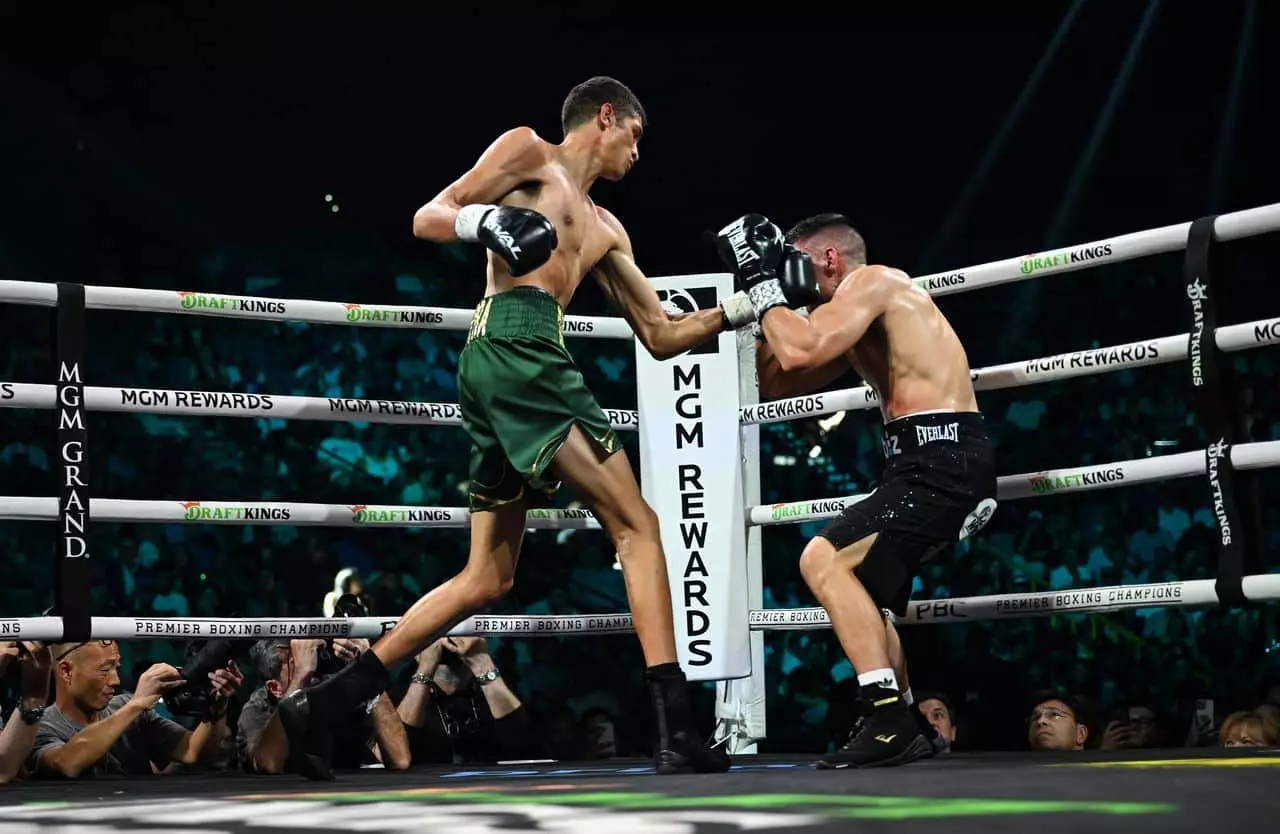Tim Tszyu’s latest setback against Sebastian Fundora marks a significant turning point in his boxing journey. Once heralded as a rising star with polished fundamentals and a relentless drive, Tszyu now finds himself grappling with doubts about his future. His seventh-round stoppage loss at the MGM Grand, following a brutal onslaught from the towering Fundora, isn’t just a defeat—it’s an alarm bell signaling that his career may be veering off course. Unlike many fighters who stumble but then rally, Tszyu’s recent performances suggest damage not only to his record but to his confidence and reputation.
What’s troubling isn’t merely the loss itself but the pattern it reveals. Three defeats in four fights highlight a worrying trend: Tszyu struggles against elite opponents, especially those with size, power, and aggressive styles. It’s not that he has become completely ineffective; rather, he appears unable to adapt or elevate his game when faced with adversity. His inability to neutralize Fundora’s early pressure exposed a vulnerability, raising questions about whether his skill set is as comprehensive as once believed. The lack of resilience to withstand early onslaughts demonstrates a mental fragility that no amount of technical refinement can fix overnight.
Psychological and Tactical Shortcomings: The Silent Killers
Boxing isn’t purely about physical prowess; mental toughness and tactical intelligence often determine the difference between victory and defeat. Tszyu’s recent performances reveal cracks in these areas. Against Fundora, Tszyu looked hesitant, almost expectant of what was inevitable—the barrage of punches from the ‘Towering Inferno’. His slow start was not just a tactical mistake; it was an indicator of a psychological hurdle. When fighters begin stunned or overwhelmed early, it’s usually a sign of underpreparedness or a fragile mindset.
Furthermore, Tszyu’s inability to reformulate during the fight illustrates a lack of adaptability. Skilled fighters can readjust mid-battle—change angles, vary punches, tighten defenses—but Tszyu seemed unable or unwilling to do so. His offense was stagnant, and his defense crumbled under pressure. This mental fragility, combined with tactical rigidity, leaves him perilously exposed to the kind of brutal starts that fundora consistently delivers. It’s not enough to have raw talent; a champion must possess the resilience to survive the storm and turn the tide.
Media and Expert Perspectives: More Than Just Criticism
Experts like Peter Badel have voiced harsh but arguably accurate assessments. They point out that Tszyu’s recent form suggests a decline—not necessarily a physical decline of talent but a spiritual and strategic one. Badel’s assertion that Tszyu’s career is “at the crossroads” echoes a broader sentiment: without significant change, his time among the top tier is nearing its end.
What’s particularly revealing is the suggestion that Tszyu’s upcoming choices could seal his fate. The idea that he might face Keith Thurman, a 36-year-old veteran with fading abilities, instead of younger, hungry contenders, implies a potentially career-derailing misstep. Such a fight isn’t a stepping stone; it’s a gamble that could further erode his stock and confidence. A loss here wouldn’t just be a setback— it could be a defining blow from which he might never recover.
Real success in boxing requires continuously proving oneself against a variety of opponents, challenging one’s limits, and evolving along the way. Tszyu’s apparent complacency or miscalculation about his readiness underscores a common trap for fighters who rise quickly but fail to adapt when faced with adversity. He’s glimpsed his ceiling, or perhaps that ceiling is closing in.
Rebuilding or Regressing: The Critical Path Forward
The narrative around Tszyu’s future must be rooted in honesty. Recovery from defeat is possible, but only if he recognizes the depth of his issues—be it mental emboldenment, defensive flaws, or strategic shortcomings. Relying solely on tune-up fights to regain form is shortsighted. When the level of competition increases, those flaws become exposed again, often with devastating repercussions.
Instead, Tszyu needs a comprehensive reassessment. That means working with trainers who can instill resilience, revisiting his tactical approach, and most crucially, rebuilding his mental toughness. A fighter of his caliber must restore belief in his capability to withstand punishment and devise ways to turn fights around, not just survive them. The window for this transformation isn’t endless; the scars of recent defeats are still fresh.
In the broader context, Tszyu’s trajectory serves as a stark lesson in the brutal reality of boxing’s unforgiving nature. Talent alone isn’t enough; discipline, adaptability, and mental strength are equally critical. If he ignores these lessons, what remains of his career might be less a story of redemption and more a cautionary tale about what happens when fighters neglect the holistic demands of their craft.

